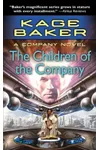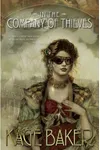Step into the thrilling world of Kage Baker’s The Company series, where immortal cyborgs zip through time to plunder history’s treasures for a shadowy corporation! This genre-bending saga of time travel, historical fiction, and corporate intrigue hooks you with its witty prose, rich characters, and a moral tightrope walk across centuries. From Elizabethan England to futuristic dystopias, The Company is a wild ride for sci-fi fans craving something fresh and thought-provoking.
With a blend of meticulous historical detail and speculative flair, Kage Baker crafts a universe where the past is a playground for Dr. Zeus Incorporated, a 24th-century outfit with big plans and bigger secrets. Ready to meet Mendoza, the botanist cyborg with a knack for heartbreak, or Joseph, the facilitator who’s seen it all? Let’s dive into this captivating series!
How The Company Began
Kage Baker, a California-born author with a flair for history and theater, launched The Company with her debut novel, In the Garden of Iden, in 1997. Her love for Elizabethan England and fascination with time travel inspired a series that spans millennia, blending her theatrical wit with sci-fi ambition. Baker, who passed away in 2010, poured her quirky humor and deep historical knowledge into a saga that grew to 12 novels and 5 novellas, earning critical acclaim and a devoted fanbase.
Baker’s vision was unique: what if time travel wasn’t about heroics but profit? Dr. Zeus Incorporated, the series’ shadowy puppetmaster, uses immortal cyborgs to preserve art, species, and artifacts for future gain. This corporate twist, paired with Baker’s knack for humanizing her immortal agents, set The Company apart in the sci-fi landscape.
The Heart of The Company
The series kicks off with In the Garden of Iden, where Mendoza, a young cyborg rescued from the Spanish Inquisition, navigates love and duty in 1550s England while collecting rare plants. Sky Coyote follows facilitator Joseph posing as a Native American trickster god in 1699 California, saving the Chumash people from colonial doom. Mendoza in Hollywood transports our botanist to 1860s Los Angeles, where she grapples with heartbreak amid early Hollywood’s chaos. The Graveyard Game ramps up the mystery, as Joseph investigates missing operatives and whispers of a 2355 deadline.
The Company weaves themes of free will, morality, and the cost of immortality. Baker’s cyborgs, despite their superhuman abilities, wrestle with human emotions—love, betrayal, and existential dread. The series’ settings, from ancient Mesopotamia to 24th-century wastelands, are vividly rendered, thanks to Baker’s historical expertise. Her sharp, humorous prose and knack for blending romance with dark corporate schemes keep readers hooked across sprawling timelines.
What sets The Company apart is its refusal to glorify time travel. History can’t be changed, and the cyborgs’ missions often feel futile, raising questions about purpose and agency. Fans love the slow-burn unraveling of Dr. Zeus’s true motives, making each book a puzzle piece in a grand, timey-wimey conspiracy.
Why The Company Resonates
The Company series carved a niche in sci-fi by blending historical accuracy with speculative daring, earning praise from outlets like Locus and a Nebula Award for the novella The Women of Nell Gwynne’s. Its mix of humor, romance, and existential angst appeals to readers who crave character-driven stories over tech-heavy plots. Baker’s ability to humanize immortals—Mendoza’s longing, Joseph’s sarcasm—creates a timeless emotional core.
Despite Baker’s passing, The Company’s legacy endures through fan discussions on platforms like Reddit and reread events on Tor.com. Its exploration of corporate greed and historical manipulation feels eerily relevant, cementing its status as a cult classic for thoughtful sci-fi enthusiasts.
- First Book: In the Garden of Iden (1997)
- Total Works: 12 novels, 5 novellas
- Awards: Nebula Award for The Women of Nell Gwynne’s (2009)
- Author: Kage Baker (1952–2010)
Grab In the Garden of Iden and dive into The Company’s dazzling world of time travel and intrigue! Whether you’re a history buff or a sci-fi geek, this series promises a journey you won’t forget.













